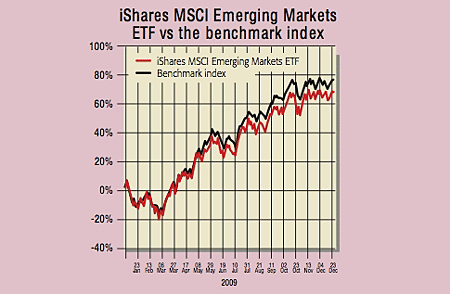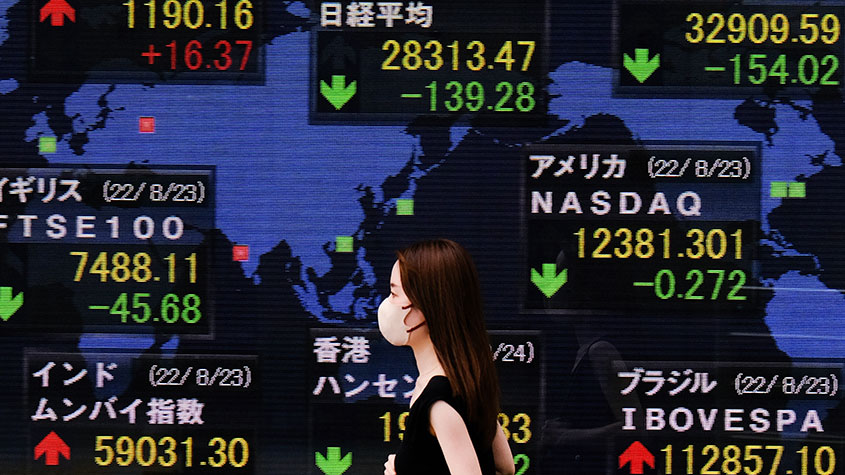Why don't tracker funds track the market?
A key selling point for exchange-traded funds is that most active fund managers fail to beat their benchmarks. But you can't always depend on ETFs to deliver the market return either. Paul Amery finds out why not.

Get the latest financial news, insights and expert analysis from our award-winning MoneyWeek team, to help you understand what really matters when it comes to your finances.
You are now subscribed
Your newsletter sign-up was successful
Want to add more newsletters?

Twice daily
MoneyWeek
Get the latest financial news, insights and expert analysis from our award-winning MoneyWeek team, to help you understand what really matters when it comes to your finances.

Four times a week
Look After My Bills
Sign up to our free money-saving newsletter, filled with the latest news and expert advice to help you find the best tips and deals for managing your bills. Start saving today!
Most active managers fail to beat their benchmarks. This is a key selling point for exchange-traded funds (ETFs) if you can't beat the market, you may as well track it. But a recent study by Morgan Stanley shows you can't always depend on ETFs to deliver the market return either. In 2009, the average US ETF underperformed its index by 1.25% in 2009, from 0.52% in 2008. Management fees account for just 0.3% of this gap. So what's going on?
To be fair to ETFs, part of the divergence is down to a mathematical optical illusion. Fees are levied daily within ETFs. So the tracking difference will always seem larger in rising markets and smaller in falling ones. So 2009's huge rally accounts for some of the rise in tracking error. But it's also partly down to ETFs moving into more esoteric areas of the market.
Take, for example, iShares' benchmark MSCI Emerging Markets fund, one of the largest American ETFs. The fund returned 71.8% in 2009, compared to 78.5% for the index. But the Europe-listed version of the iShares fund did a little better, returning 75.4%, while db x-trackers' MSCI Emerging Markets ETF returned 77.5%.
MoneyWeek
Subscribe to MoneyWeek today and get your first six magazine issues absolutely FREE

Sign up to Money Morning
Don't miss the latest investment and personal finances news, market analysis, plus money-saving tips with our free twice-daily newsletter
Don't miss the latest investment and personal finances news, market analysis, plus money-saving tips with our free twice-daily newsletter
Why? The iShares ETFs, which track the index by physically owning the underlying stocks, held a lot of "offshore" emerging market shares ADRs and GDRs particularly in the US version. The performance of ADRs and GDRs last year differed from the locally listed shares used in the index calculation, so the fund and benchmark returns didn't match up.

The db x-trackers fund, on the other hand, uses swap-based replication, where the parent bank guarantees the index return to the fund (less fees). This should mean better tracking, though at the expense of some risk exposure to the bank involved.
Tracking error is not all one way. Some ETFs beat their indices. This can happen because of differing tax treatment of dividends between fund and index, or because the fund is making extra returns from another source, such as lending its stocks (although this isn't risk-free).
So check out an ETF's tracking ability before you buy. Simply look at the issuer's website and compare the fund return with the index return over different periods. Funds tracking popular benchmarks, such as the FTSE 100, S&P 500 and Euro Stoxx 50, should have few problems. But for less liquid or more exotic areas emerging markets, corporate bonds, or small-caps tracking error could be a real concern.
Paul Amery is editor of www.indexuniverse.eu , the top source of news and analysis on Europe's ETF and index fund market.
Get the latest financial news, insights and expert analysis from our award-winning MoneyWeek team, to help you understand what really matters when it comes to your finances.
Paul is a multi-award-winning journalist, currently an editor at New Money Review. He has contributed an array of money titles such as MoneyWeek, Financial Times, Financial News, The Times, Investment and Thomson Reuters. Paul is certified in investment management by CFA UK and he can speak more than five languages including English, French, Russian and Ukrainian. On MoneyWeek, Paul writes about funds such as ETFs and the stock market.
-
 New PM Sanae Takaichi has a mandate and a plan to boost Japan's economy
New PM Sanae Takaichi has a mandate and a plan to boost Japan's economyOpinion Markets applauded new prime minister Sanae Takaichi’s victory – and Japan's economy and stockmarket have further to climb, says Merryn Somerset Webb
-
 Plan 2 student loans: a tax on aspiration?
Plan 2 student loans: a tax on aspiration?The Plan 2 student loan system is not only unfair, but introduces perverse incentives that act as a brake on growth and productivity. Change is overdue, says Simon Wilson
-
 Profit from MSCI – the backbone of finance
Profit from MSCI – the backbone of financeAs an index provider, MSCI is a key part of the global financial system. Its shares look cheap
-
 Ashoka: A new, but reliable, trust you can count on
Ashoka: A new, but reliable, trust you can count onOur investment columnist, Max King, says tough times breed investment trusts like Ashoka, that you can trust.
-
 Should you stick with Mid Wynd investment trust?
Should you stick with Mid Wynd investment trust?Tips Max King looks at the prospects for Mid Wynd as the trust prepares to say goodbye to Simon Edelsten and Alex Illingworth, managers of the trust since 2014.
-
 What is an index fund?
What is an index fund?Glossary We outline everything you need to know about index funds, from what they are and how to buy them, to the things to consider before you do so.
-
 Low-cost index funds for simple investing
Low-cost index funds for simple investingTips Index funds are an easy, low-cost way for investors to invest in a sector or asset class. Here’s a selection of the cheapest passive tracker funds on the market right now
-
 Analysis: it’s been a terrible six months for investment trusts
Analysis: it’s been a terrible six months for investment trustsAnalysis The first half of the year has not been kind to investment trusts because of their skew towards growth stocks and the global downturn, says Max King. But they will recover.
-
 A core US fund that should be part of every portfolio
A core US fund that should be part of every portfolioAnalysis The UK market’s recovery might not be here to stay. America offers a compelling alternative, says Max King.
-
 Three healthcare trusts to invest in
Three healthcare trusts to invest inAnalysis The biotech sector is in its biggest bear market in 30 years. But Max King explains why this sector could turn around soon and three healthcare trusts that may be worth investing in.
